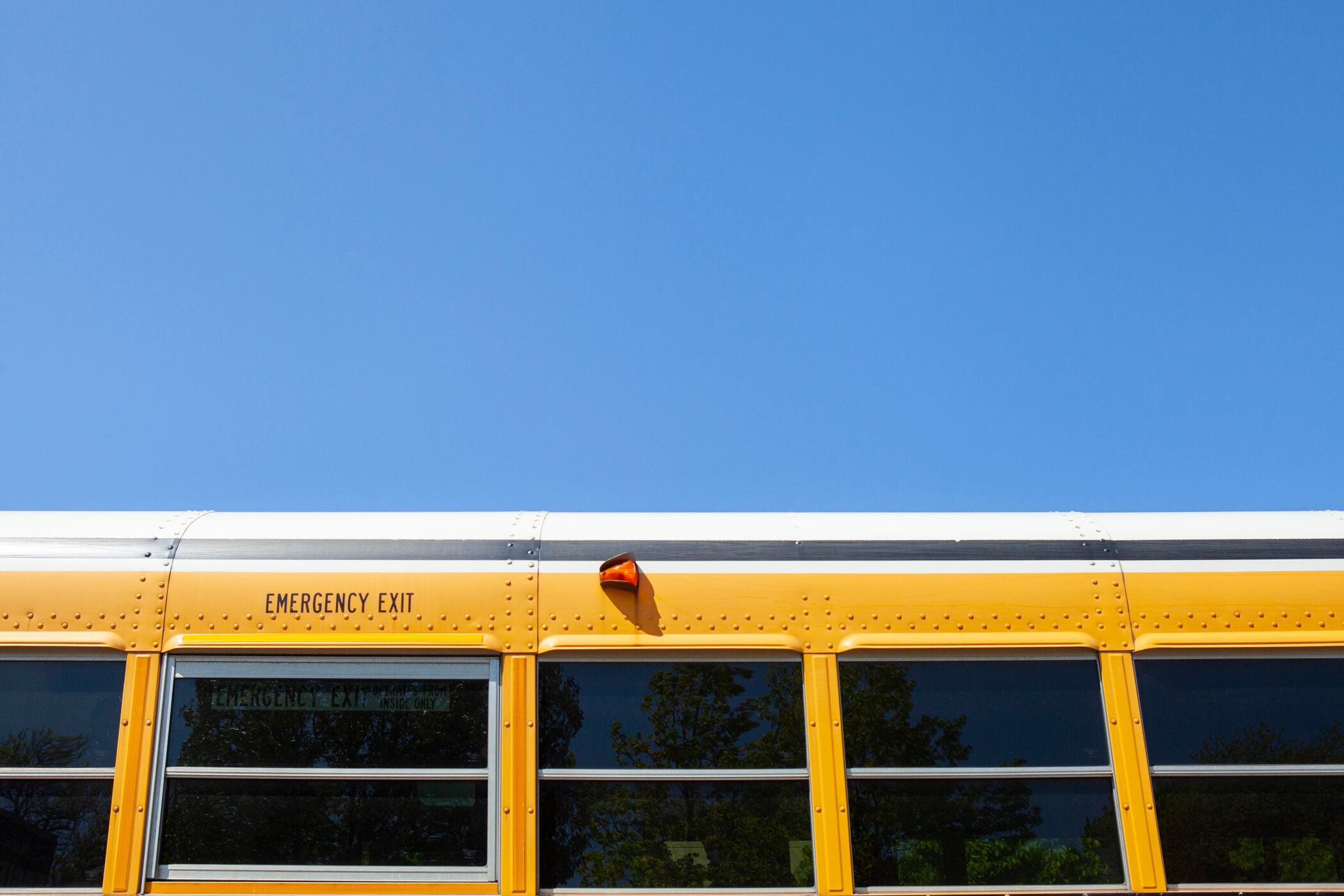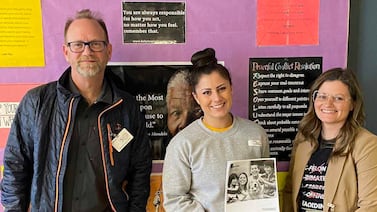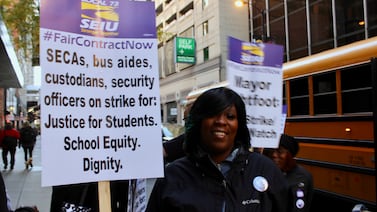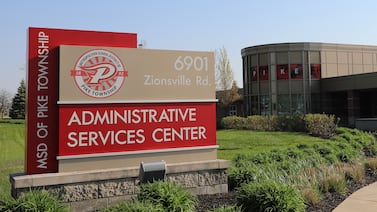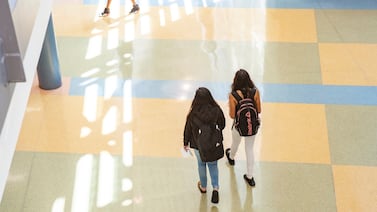For months, Chicago Public Schools has struggled to provide transportation for students with disabilities and those in temporary housing. Now, the district could end up tackling the problem by shifting bus service away from selective enrollment schools and magnet schools that draw students from all over the city.
Under a resolution adopted Wednesday by the Board of Education, the district would “reroute some or all students as necessary” at magnet, selective enrollment, and other option schools and use those buses for students with Individualized Education Programs, medically fragile students, and students in temporary housing who haven’t yet received reliable transportation.
The resolution would go into effect at the end of February if the issue remains unresolved. The district would need to provide services to students with disabilities no later than March 7, with services continuing through the end of the 2021-2022 school year.
Board member Elizabeth Todd-Breland said the resolution set a timeline to ensure transportation for students with the highest needs.
A similar resolution proposed in September would have prioritized special education and children experiencing homelessness over magnet students, but it was not made public after a meeting with Mayor Lori Lightfoot’s office, Todd-Breland said.
“We continue to put off this difficult decision, and that’s where we find ourselves today,” she said. “I want to be clear, no one is taking this lightly or cavalierly.”
In responding to Todd-Breland, a spokesperson for the mayor said Lightfood had repeatedly said that “providing transportation for all CPS students is an urgent priority.”
“The Interim CEO of CPS at that time had shared possible solutions for busing students, however the Mayor’s Office was never presented with a formal resolution,” the spokesperson said in an email statement.
Chicago Public Schools annually provides transportation to about 12,754 students of which 56% are students with disabilities. Students with disabilities have transportation written into their Individualized Education Programs, a legally binding document that outlines services they receive. The requirement is backed by federal law.
Since the start of the school year, Chicago, along with districts nationwide, has been plagued by school bus driver shortages, leaving thousands of students without a dependable ride to school.
The district made headway chipping away at the number of students without reliable rides to school since the start of the school year. Still, 631 students with disabilities, or medically fragile students are still without reliable transportation — compared to about 2,335 in October.
An additional 300 transportation requests for students with disabilities have come in since September, officials said.
The national driver shortage has strained the district’s transportation services. The district started the school year with 500 bus drivers instead of the 1,200 required to meet student transportation needs.
District officials said they are working to continue hiring bus drivers and finding other modes of transportation to fill the needs, and avoid disrupting service to general education students.
Kimberly Jones, the district’s transportation chief, said CPS is in the process of hiring more bus drivers and expected to be able to provide transportation to all the students before the Feb. 28 deadline.
The district has names of more than 200 applicants, with more than 100 going through background checks, Jones said. Twenty-three drivers have been cleared and have started transporting students, she added.
But board vice president Sendhil Revuluri questioned whether the district could reach its staffing targets by February, given that it hadn’t been able to solve the problem across the past five months.
Both Jones and CEO Pedro Martinez said they were confident they would meet the deadline, and would discuss at the next meeting if it isn’t looking like progress is being made.
In the meantime, Martinez said the district is already looking ahead into the next school year to start planning how to leverage different modes of transportation to meet the needs of its students with disabilities and other vulnerable students.
As part of the resolution, the district will also provide financial assistance to parents of all general education students affected by the suspension of bus routes, with $1,000 upfront and $500 a month beginning in March 2022 through the end of the school year.
The resolution would also require the district to update board members every month starting Feb. 23 of compensatory education meetings held for students with IEPs who receive transportation but did not have a route as of the first day of the 2021-2022 school year.
Since the fall, the district’s transportation department has been teaming up with taxi firms and a company called RideAlong, which specializes in providing rides to children, in order to make up for the bus driver shortages. The district has also offered to reimburse families who have opted to find alternative transportation for their child.
Still, in its resolution, the Chicago Board of Education acknowledged it was not meeting transportation needs.
Todd-Breland said the district needed to act now to address the transportation problem, rather than continuing to kick the problem down the road.
We need to make a decision “to do right by our most vulnerable students,” she said.
Board member Luisiana Meléndez said she fully supported the resolution but hoped it wouldn’t need to be implemented because the issue will be solved before the deadline.
“This is not an easy choice,” Meléndez said, but she acknowledged the board had an ethical, moral, and legal obligation to prioritize vulnerable students.
In October, parents told Chalkbeat Chicago the district had canceled bus routes for their children with little notice, leaving them with few alternatives to get their child to school.
The bus problems have been an ongoing issue for some families, who have been “significantly impacted by a lack of transportation,” said Barb Cohen, policy analyst for Legal Council for Health Justice.
While many families have found resolution after filing complaints with the Illinois State Board of Education against the district for violating state law, there are still a considerable number of parents without reliable transportation, Cohen said.
“We have a number of families where the students missed months of school,” Cohen said. In that time, students with IEPs have missed critical services such as speech therapy, occupational therapy, and social work services, she said.
“They’re particularly hurt by the inability to get through the school door,” Cohen said.
Cohen endorsed the shift of the district’s transportation policy, stating the priority needed to be “students who have a legal right to transportation.”
Still, Cohen questioned why the district was waiting over a month before the policy would take effect.
Rachel Shapiro, managing attorney for Equip for Equality, echoed Cohen’s concerns over waiting another month to shift the policy to provide transportation to which these students are legally entitled.
“What will change between now and Feb. 28 to make the situation any different?” Shapiro said.
In reviewing the resolution, Shapiro said it was concerning why the district had not been prioritizing these students to begin with.
“Certainly students who are homeless and students with disabilities have a legal entitlement,” Shapiro said. “They should be at the front of the line.”


